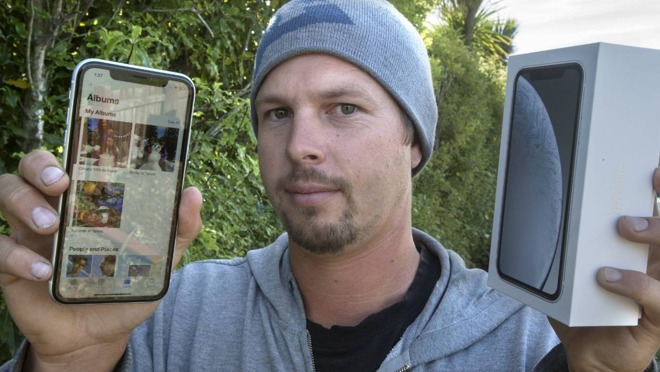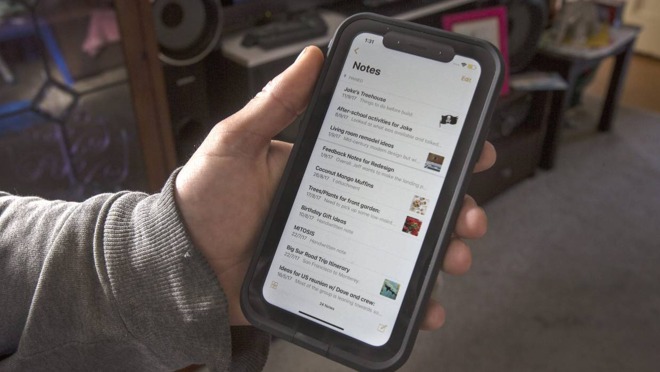Sealed iPhone loaded with data likely just a demo unit sold in error
A man reportedly bought what was packaged as a new iPhone, only to find what appears to be personal data from a previous owner -- but there are hints that it may be a demo unit, resold by a third-party vendor.

Content in the phone included flight, bank, and medical details, as well as voice messages from the owner's daughter, Glen Cottle told Stuff. The prior owner also had smarthome controls enabled for lighting, heating, and a front door lock.
Cottle said he suspects the earlier owner was Australian, but that he hasn't had any luck trying to contact him. The iPhone was bought sealed from a Smith's City store in Timaru, which was allegedly "horrified" when it learned about the situation and ready to swap for a new device.
It's not clear how the mistake could have happened. One possibility is that it was a resealed phone from Smith's or third-party store. Another is that it was a demo unit, and indeed a screenshot from the Notes app shows the sort of generic, idealized samples Apple tends to use.
Further suggesting a demo unit, one note even references a road trip along Big Sur, a section of the California coast. The company tends to be California-centric in marketing despite a global audience.

Assuming the device was resealed after return, for Cottle to use the phone, and access the data, the device must not have been locked with Face ID or a passcode. Demo units provided to retail by Apple aren't passcode protected.
The incident nevertheless reinforces the need to wipe an iPhone before selling or trading it.

Content in the phone included flight, bank, and medical details, as well as voice messages from the owner's daughter, Glen Cottle told Stuff. The prior owner also had smarthome controls enabled for lighting, heating, and a front door lock.
Cottle said he suspects the earlier owner was Australian, but that he hasn't had any luck trying to contact him. The iPhone was bought sealed from a Smith's City store in Timaru, which was allegedly "horrified" when it learned about the situation and ready to swap for a new device.
It's not clear how the mistake could have happened. One possibility is that it was a resealed phone from Smith's or third-party store. Another is that it was a demo unit, and indeed a screenshot from the Notes app shows the sort of generic, idealized samples Apple tends to use.
Further suggesting a demo unit, one note even references a road trip along Big Sur, a section of the California coast. The company tends to be California-centric in marketing despite a global audience.

Assuming the device was resealed after return, for Cottle to use the phone, and access the data, the device must not have been locked with Face ID or a passcode. Demo units provided to retail by Apple aren't passcode protected.
The incident nevertheless reinforces the need to wipe an iPhone before selling or trading it.

Comments
If you wish to continue this aspect of the conversation, please do so in my direct messages and not here in the forums.
The demo content is typically pre-loaded so it could have been a sealed unit.
Also, the retail box has the text "iPhone" on both of the long sides in silver ink (which might contain anti-counterfeiting ink). The box in the attached photo has no markings. Curiously, the photo on the front appears to be grayscale, not in full color like the retail box. This phone was never intended to be sold as a brand-new retail device.
It's either a demo unit or a field replacement unit -- likely the former based on the demo content.
This sounds like a brand new demo unit that was never set up in store.
The store would have had to enrol it in MDM and manually disable the device if they want that ability.
Meanwhile android is sending all your info to anonymous servers.
It came preloaded with a retail image that has preloaded apps on it to showcase the device.
The dealer was either greedy or incompetent in figuring out this was a demo unit.
One way to find out would have been to scan the serial number into the site that Apple provides it’s resellers which would have told them this is a demo unit and belongs to Apple.
In the past I purchased a Mac cube from Circuit City when Apple ended their relationship. Turns out what they sold me was a demo unit that belonged to Apple and was not part of CC’s inventory. I found out when calling Applecare. The rep was laughing when he found out that a demo unit was sold, he ended up transferring the warranty to me and replaced a set of mangled speakers that came with the Mac.
they said Smiths in the article. so yeah 3rd party. who might get the demo image from Apple but set up without any of Apple's special security that needs an Apple wifi etc